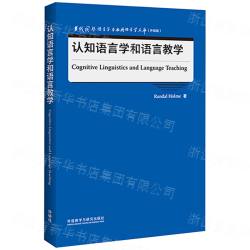-
内容大纲
进入21世纪后,认知语言学研究表现出的一个比较明显的趋势是与其他学科相结合,产生了新的研究视角。本书的最大亮点是作者并没有空泛地倡导用认知语言学理论指导二语课堂教学,而是有针对性地设计了不少适用于课堂教学的练习和活动,其中既有词汇学习方面的活动,也有语法学习方面的活动。本书是将认知语言学理论运用于语言教学实践的一个大胆且有益的尝试。 -
作者介绍
-
目录
List of Activities
List of Figures and Tables
1 Introduction
The linguistics applied approach: generative linguistics and second language learning
The applied linguistics of second language learning
Language as a social semiotic
The emergence of cognitive linguistics
Ending the LA-AL divide
The purpose of the book
Part Ⅰ Embodied Experience
2 The Problem of Linguistic Meaning
Introduction
The problem of meaning
Language learning as category learning
Conclusions
3 Conceptualisation, Embodiment and the Origins of Meaning
Introduction
Proprioception: how the body remains aware of its own position in space
Not seeing but conceptualising
Cognitive development and infant movement
Aplasic phantoms
Mirror neurons
The nature of language: image schemas and embodied cognition
Education and embodiment
Language teaching and embodiment: language as rhythm and movement
Language teaching and embodiment: mime, enactment and movement
Language teaching and embodiment: rethinking TPR Conclusions
4 Gesture
Introduction
The importance of gesture in communication
Gesture in education
Gesture and teaching prepositions
Gesture and English articles
Conclusions
Part Ⅱ Conceptualisation
5 Language, Culture and Linguistic Relativity
Introduction
The Sapir-Whorf hypothesis
Meaning and conceptualisation
Linguistic relativity: how different is different?
Experimental evidence for linguistic relativity
To learn new meanings, do we have to conceptualise the world differently?
Second language errors and linguistic relativity
Errors that use first language forms and meanings within the second language
Errors that over-generalise some acquired formal or semantic feature of the second languageFalse friends
The problem of separating meaning from conceptualisation
Can one change a conceptualisation?
Language, culture and conceptualisation in the classroom
Language, culture and learning
Different meanings for different languages
Conclusions
6 Conceptualisation and Construal
Introduction
Construal operations
Attention and salience
Attention, salience and enactive SLA
Metonymy: attention and salience
Scope of attention
Scalar adjustment
Dynamic attention
Judgment and comparison
Category formation
Category formation and language teaching
Metaphor
Metaphor and language teaching
Metaphor analysis
Metaphor and target language differentiation
The explanatory power of metaphor and analogy
Using metaphor to learn second language lexis and grammar
Figure-ground conceptual operations, force dynamics and action chains
Perspectives and situatedness
Deixis
Constitution/gestalt
Geometry
Conclusions
Part Ⅲ Meaning and Usage
7 Teaching Encyclopaedic Meaning
Introduction
Word networks: hyponymy and schematicity
Word networks: meronymy
Crossing category borders
Knowledge types and encyclopaedic meaning
Finding the frame
Phonological sense relations
Conclusions
8 Usage and Grammatical Meaning
Introduction
Constructions
Type and token
Usage
Language learning as construction learning
Recognising constructions
Teaching constructions
Teaching filled constructions: idioms
Teaching partially filled constructions: lexis, meaning and conceptualisation
Teaching partially filled constructions: bound morphemes, inflections and lexis
Teaching partially filled constructions: bound morphemes
Teaching partially filled constructions: lexis and morphemes
Teaching partially filled constructions: lexis
Teaching unfilled constructions
Routines for more advanced students: lexis, meaning and conceptualisation
Encountering constructions
Finding useful forms
Conclusions
Part Ⅳ Conclusions
9 Towards a Cognitive Linguistics Syllabus
Introduction
Product and process
Language teaching implications
Re-embedding linguistic form in the imagery and movement from which it emerged
Engage the learners in the explicit analysis of form and meaning
A forum for usage
Sequencing
Bibliography
Index
同类热销排行榜
- 目送/人生三书
-
 21世纪的《背影》 + 感人至深的“生死笔记”+ 龙应台亲手摄影 + 跨三代共读的人生之书!
华人世界率性犀利的一枝笔,龙应台独家...
21世纪的《背影》 + 感人至深的“生死笔记”+ 龙应台亲手摄影 + 跨三代共读的人生之书!
华人世界率性犀利的一枝笔,龙应台独家...
- 顾城的诗(金版)(精)/蓝星诗库
- 人类群星闪耀时(插图本)/译林名著精选
- 牛津高阶英汉双解词典(附光盘第8版)(精)
- 文化苦旅(新版)
- 摆渡人
- 解忧杂货店(精)
- 骆驼祥子
- 曾国藩(又笨又慢平天下)
- 查令十字街84号(珍藏版)(精)
推荐书目
-

孩子你慢慢来/人生三书 华人世界率性犀利的一枝笔,龙应台独家授权《孩子你慢慢来》20周年经典新版。她的《...
-

时间简史(插图版) 相对论、黑洞、弯曲空间……这些词给我们的感觉是艰深、晦涩、难以理解而且与我们的...
-

本质(精) 改革开放40年,恰如一部四部曲的年代大戏。技术突变、产品迭代、产业升级、资本对接...

 [
[
